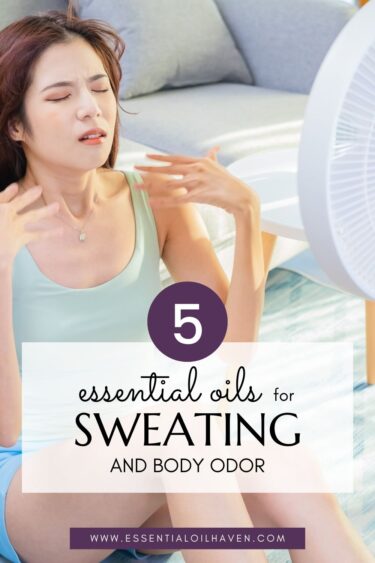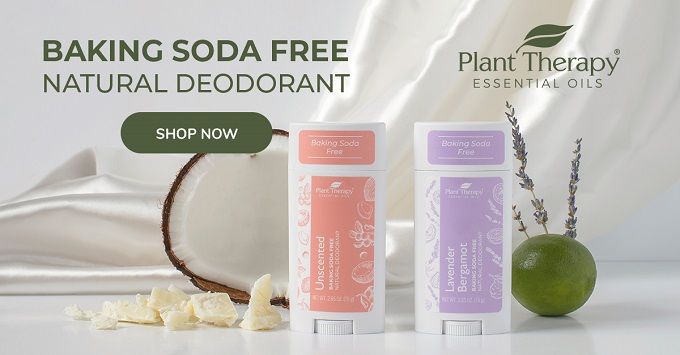
Body odor is a common problem faced by both men and women from teens to adults. Regardless of whether it’s good or bad, body odor is a touchy issue that makes a big impact on a person’s confidence and well-being. But sweating and body odor is not something to be afraid of; in fact, sweat is a natural part of life.
If you like to treat yourself and your surroundings with all things natural, this article will show you how to use essential oils to help with body odor. You’ll learn which oils to select and how to put them to use!
What Causes Body Odor?
Our bodies are all very individual. Each one of us has a different body chemistry and make-up, all playing into what body odor looks like for you. Some common factors that affect our body odor, are:
This post contains affiliate links, which means if you make a purchase through these links, I may receive a small commission at no extra cost to you. Read my full disclosure policy here.
- Age. During puberty, the sweat glands become more active (apocrine gland), and the sweaty region of the body like armpits or scalp starts producing a fatty form of sweat. This oily sweat can easily attract bacteria, which break down the sweat particles and produce an unpleasant odor from the body. Menopausal women can also have a change in their amount of sweat ¹.
- Another factor worth considering is the weather. It is natural for us to sweat more under the heat of the sun. Thus, sweat + bacterial growth = body odor.
- Food. Yes, you heard that right. The kind of foods that we eat can have a major impact on our body odor at least temporarily. Foods as broccoli and red meat can significantly have an effect on a person’s body odor because of their sulfur compounds.
- Body weight and other underlying conditions. Obesity, diabetes, and thyroid issues can definitely change the way a person smells because the sweat’s consistency is changed and usually, they have a distinct smell that a doctor can easily recognize. There are also certain medications that can increase your perspiration.
- Clothing. Clothes that are made of a lightweight cotton fabric such as cotton, linen, and chambray are the most breathable fabrics around so it will allow a little airflow for drying out the sweat. Some fabrics such as polyester based fabrics, rayon, and denim repels sweat/moisture which can cause irritation, discomfort and of course, unwanted body odor.
Natural Body Odor Treatments
Sweating is actually good for you! But if body odor is an issue, it can easily be prevented. Essential oils are known to contain different properties that battle offensive body odor. Many essential oils have been used for thousands of years in several cultures for medicinal and wellness purposes. At times, a blend of different and complimentary essential oils are used to boost their effectiveness.
It’s amazing how the simplest remedies can help a lot of common problems. With guidance and proper research, you can definitely use select essential oils to feel good and smell good!
DIY Deodorant Blend Recipe

Many commercial deodorants are actually the cause for our bodies expelling so much stink.
The most basic way to use essential oils is to make your own deodorant blend, which you then apply to affected areas such as underarms, feet, or the palm of your hands.
Dilute the essential oils with a mild carrier oil such as Grapeseed oil at a 2% dilution rate safe for topical application. Read more about carrier oils here and refer to the beginner’s guide to dilution rates for more info on how to dilute and ensure skin safety.
Use:
- 10 mL carrier oil = 2 tsp carrier oil
- 6 drops of essential oils of choice
For larger quantities, adjust accordingly.
5 Best Essential Oils for Body Odor
Here’s a list of essential oils that you can incorporate in this odor busting DIY project. These top 5 essential oils for body odor are antimicrobial, anti-fungal and antibacterial.
1. Lemon Essential Oil
Aside from its distinctly refreshing aroma, lemon essential oil and the fruit itself have been used for thousands of years by Ayurvedic medicine to treat a vast range of health issues. It is acidic by nature and can slightly change your skin’s PH level – thus inhibiting bacterial growth.
NOTE: Test the underarm area or a small patch of skin before using to check for hypersensitivity to this type of essential oil.
Since lemon essential oil is made of the peel and rinds of the fruit, I always recommend organic Lemon. A lot of chemicals used during commercial farming make it into a fruit’s peel. Conversely, in organic farming, such additives are minimized hence also minimized in the essential oil end product we consume.
2. Lavender Essential Oil
Being certainly one of my most loved oils, Lavender essential oil is proven to contain antiseptic and antibacterial properties ². It’s sweet, flowery aroma can surely lift your mood and make you smell good!
Add a drop together with rose, clary sage, patchouli, and mandarin essential oils for a soft floral scent. Just don’t forget to conduct a skin test to ensure safety – even though it’s Lavender!
NOTE: Avoid using the essential oil mixture on freshly shaven underarms as it can produce a stinging sensation or cause irritation.
3. Rosemary Essential Oil
Rosemary oil is a popular essential oil known for its wide array of health benefits. It has a mesmerizing aroma, which makes this essential oil an amazing odor blocker and a stress reliever.
Because of its antimicrobial and skin improving qualities, you can create your own blend by using the Rosemary Essential Oil as a base and mixing five drops of sage essential oil, five drops of coriander essential oil, five drops of lavender essential oil, and 2 ounces of distilled witch hazel in a spray bottle. Use it as a regular spray.
Learn more about blending essential oils here.
4. Geranium Essential Oil
Being known for known for balancing the mind and sorting out emotions to help you relax and have that stress-free feeling after a long day of work or school, using Geranium essential oil can also protect your body from perspiration. When you sweat you could smell like flowers instead!
With Geranium’s antibacterial properties, it can eliminate body odors. Add 5 drops of oil to a spray bottle and mix it with 5 tablespoons of water. Its amazing scent is quite similar to orange, rose, or lemon.
- See also: 13 Benefits of Geranium Essential Oil
5. Tea Tree Essential Oil
Tea tree has become a popular health remedy because of its skin care capabilities, some even referring to is as “Medicine in a Bottle”. Often used as an antiseptic, antifungal, and anti-acne oil, mix it with other essential oils and distilled witch hazel as an odor blocker or to freshen up after hitting the gym.
Please take note that tea tree oil isn’t for everyone. It is possible to have an allergic reaction, which could include a rash or reddening of your skin that’s why having a skin patch test is important.
Here’s a beginner’s guide to essential oil dilution rates, how to do a skin patch test, and other ways to use Tea Tree oil.
Commercial Natural Deodorants

I love the Natural Deodorants from Plant TherapyGet It Here
With the rising awareness for more organic and healthier choices, there are already a number of choices for ready-to-use natural deodorants. Should you, after reading this article, decide that a natural deodorant is easier than a DIY deodorant, I’ve used and can recommend Plant Therapy’s natural deodorants. They smell super fresh, doesn’t stick to clothing, and actually work!
Also, to help you make the switch to natural deodorant, I’ve written down my personal journey of switching to natural deodorant for you! It summarizes 5 tips for a successful switch.
Other Easy Ways to Control Body Odor
- Aside from regularly changing to clean clothes, wear clothes that are made of breathable fabrics such as cotton and linen. You can also incorporate essential oils to your laundry by tossing dryer balls with a few drops of your favorite essential oils for a kick of a pleasant smell to your everyday clothes.
- Keep your underarms or your problem areas dry so the bacteria have a hard time growing and produce an unpleasant smell. Apply baking soda with a few drops of lavender, lemon, and peppermint essential oils for a quick underarm detox.
- Make your own antibacterial bath soaps by adding a mix of essential oils with antibacterial and antimicrobial properties. Here’s how you can create DIY soaps which you can fully customize depending on the scent you are going for.
- Shave or pluck armpit hairs regularly. Hair traps bacteria thus resulting in body odor.
What do you think?
Body odor is commonly frowned upon and is considered a reflection of one’s hygiene (even though it isn’t so!). Essential oils are a great way of addressing this issue from the source in a natural, non-chemical way. Aside from essential oils’ antibacterial properties, their relaxing properties are also a great aid in relieving stress related to unpleasant or unwanted B.O.
What is your favorite essential oil for eliminating unwanted body odors? Have you tried any of these tips? Let me know in the comments below!
References
¹ Menopause and sweating link: https://www.webmd.com/menopause/features/menopause-sweating-11#1
² Lavender oil antiseptic links: https://www.medicalnewstoday.com/articles/265922.php and https://www.ncbi.nlm.nih.gov/pubmed/12112282


Leave a Reply